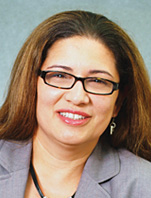This website uses cookies
We use cookies to ensure that we give you the best experience on our website. If you continue to use this site we will assume that you are happy with it.
Maria Fernandez-Williams ’92 believes that affirmative action still has a role to play in American society. “When we can affirmatively say that race is not an issue in promotion, pay, or success rate in school, then we can retire our affirmative action programs,” she said.
 Fernandez-Williams, who has worked for IBM in a number of areas since her graduation from Cornell, is becoming more involved with the Cornell Law School’s LALSA (Latino American Law Students Association) and BLSA (Black Law Students Association) students. She notes that they “are still struggling with some of the issues I struggled with back then.”
Fernandez-Williams, who has worked for IBM in a number of areas since her graduation from Cornell, is becoming more involved with the Cornell Law School’s LALSA (Latino American Law Students Association) and BLSA (Black Law Students Association) students. She notes that they “are still struggling with some of the issues I struggled with back then.”
“It’s exposure,” she explains. “When I was in law school, I did not know a lawyer. I didn’t know what to expect or even what they made. I just knew I wanted to be a lawyer!”
Today’s students ask her about everything from their perceived Spanish accents to what job would be best for them to take. She is concerned that they may feel, as she did, “I’m different and I don’t quite fit in and don’t know if I’ll succeed.”
Fernandez-Williams grew up in the Bronx, “in the same neighborhood as Justice Sotomayor,” she said. “I went to the same schools she did. My parents pushed and pushed, and there was no question but that I would go to college.”
After graduating from Cornell Law School, she went to work for IBM, where she still works. “That’s unusual, but a good experience,” she said. “They gave me a lot of responsibility early on, and I’ve had a lot of diverse jobs here.” Her positions include serving as senior counsel for their North America Sales Division, for Latin America, and for the Global Compliance Program. Currently she’s responsible for joint development alliances and technology licensing for IBM’s semiconductor process technology. “I had to get up to speed—lots of very smart people had to explain the technical concepts to me,” she said. “As a negotiator, I have to be able to bridge the discussion between legal and technical issues.”
As a longtime New York City resident—she went to Lehman College (City University of New York)—Fernandez-Williams didn’t immediately consider Cornell Law School. But a cousin, who was a Cornell undergraduate, convinced her. “She brought me an application and said fill it out, I’ll take it back,” Fernandez-Williams recalls. As a single mother with a two-year-old daughter, however, staying near her parents seemed like a better idea—even when the cousin committed to help with child care.
Then Fernandez-Williams went to an event for admitted minority students at the Law School. “Either Dean Lukingbeal or Dean Geiger came up to me and asked if I brought Lauren with me. The fact that they read my essay that talked about my daughter and knew it was important to me, I thought—this is a school that cares about who you are. Then all the LALSA students said—we’ll be there for you.”
“I had my support. I had my village,” Fernandez-Williams recalled. Later, she served as president of LALSA.
Professor Sheri Lynn Johnson, who had sponsored the event for minority students, was part of that village. “There’s something about her that’s so approachable,” said Fernandez-Williams. “I knew if I needed something I could go to her.”
“Cornell Law School prepared me well for IBM, and my nonprofit participation as well,” Fernandez-Williams said. “While I knew that I wanted to become an in-house counsel, I also was influenced by the public interest spirit and clinics the school offered. I figured out early in my career that I wanted to combine both.”
She has served on the board of the Committee for Hispanic Children and Families, and currently is on the board of LatinoJustice PRLDEF. She is a member of the John Jay Pre Law Institute Advisory Board and has been involved with the Hispanic National Bar Association on the local and national level.
Returning to the need for affirmative action, Fernandez-Williams talked about her experience at IBM. “Our customers are global and diverse and the world is more connected. If we don’t figure out how to exist in that diverse world, we can’t succeed.”
“My father came here illegally from Spain,” she says. “My mother is American, from Puerto Rico. Marriage to my mother made him a resident. They produced a lawyer, an executive producer, and a son who did two tours in Iraq. It’s the American Dream.”